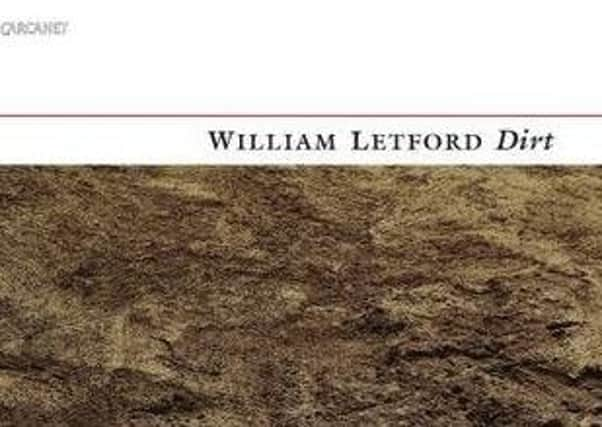Book review: Dirt by William Letford


Dirt by William Letford | Carcanet, 62pp, £9.99
There have been some very moving poetry collections released so far this year – those by Helen Mort and Bernard O’Donoghue particularly stick in the mind – but at time of writing William Letford is the only poet whose work has had an observable physical effect on me. The poem in question, “This is it”, was featured in The Scotsman’s Poem of the Week slot recently, and it is one of the highlights of Letford’s new collection Dirt, out on Carcanet later this month. It gave me chills when I first read it in an email, and it had the same effect when I encountered it on the page: as I reached the final few lines I noticed the hairs on my arms standing up, and at the denouement a pleasant little electric shock went pulsing across my scalp, a couple of inches above my left ear.
Dennis O’Driscoll famously wrote that poetry is “music set to words” and, in common with music, it has the power to give us the chills or what some researchers, presumably looking to score career-furthering academic impact points, choose to call “a skin orgasm”. I can think of plenty of pieces of music that have this effect on me, but few poems. A number of performance poets have given me skin orgasms in the past (I remember Shane Koyczan being particularly orgasmic on the Fringe a few years back), but on the page Letford is one of only a handful.
Advertisement
Hide AdThe physiological processes behind the chills were explored in the 1990s by an American neuroscientist called Jaak Panksepp, whose research at the University of California (where else?) demonstrated that sad music triggers them more often than happy music. Panksepp went on to suggest that melancholic tunes might activate the same basic distress response that our ancestors felt when separated from family. (When played recordings of their infants’ cries, Panksepp observed, some mothers experienced similar physical effects.) Subsequent research has suggested that moments of surprise in music, or moments where tension is gradually built up and then suddenly released, can often trigger bouts of the chills.
How does all this relate to “This is it”? Well, the set-up is unassuming, even a little melancholy. The poet is back in his home town after a period away, “Skint, baw ragged, poackets full eh ma / fingers”. He’s outside Greggs, eating a macaroni pie when a busker plugs his guitar into an amp and begins to play. Passers-by pretend not to notice how good he is. So far, so downbeat. But then out of nowhere, an epiphany:
I’d like tae tell him thit this is it, this is
where the hammer hits the stane an sparks
ur made, standin oan a coarner in yur hame
toon, an audience eh one radge eatin a
macaroni pie, bit singin, wee man, yur singin.
There are a couple of other poems in Dirt that follow the same pattern of a slow build towards a sudden, unexpected moment of revelation, but the pay-offs don’t quite achieve the same impact: “In a bamboo shack on the edge of a beach” is one; “Marriage” is another, although the latter’s heartfelt celebration of “the wonder in the everyday” will, if there’s any justice, become a staple at weddings for years to come.
It’s a little unfortunate that so many of the poems in this collection are so slight – about half of them are ten lines long or less. Not that there’s anything wrong with brevity, but Letford’s great gift is his ability to tap into his reader’s emotions, and it’s hard to be moved by something that’s over almost before it’s begun. When he hits his stride, though, sparks are made, and there really is nobody else like him.
• William Letford, Edinburgh International Book Festival, today